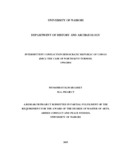| dc.description.abstract | The study set out to examine and analyze factors responsible for the intermittent,
mutation and the impact of the conflict in the North Kivu, Democratic Republic of
Congo. Despite the presence of the largest contingent of United Nations Peacekeepers,
the conflict had persisted and civilians continued to experience atrocities and bore the
brunt of the violence. The study draws extensively from theoretical frameworks on failed
states theory and conflict systems theory advanced by William Zartman et al., and
Makumi Mwagiru respectively. It seeks to respond to the question of continuity of the
conflict in North Kivu and examine factors underlying emerging mutations and impacts
of the same.
The study contends that the continuity of conflict is a function of absence of security
engendering ideas critical for developing institutions. It’s the failure of the DRC
government to engender ideas critical to the establishment of strong institutions vis-à-vis
strongman. These encompass both internal and external dynamics. Response to the
above entails state, regional and global policy constructs and actions.
To achieve the above, the research field was conducted in the Kivu region from 19th May
2014 to 1st June 2014 and April 2015 to May 2015, the study covered the period from
1994 to 2004. The conflict in the DRC has been raging for the last two decades and
despite the signing of peace agreements the conflict has continued to mutate and the
reconstitution of the state has proved futile. The research adopted in-depth interview,
interview guide and observation, recording in data collection and analyzed qualitatively
and descriptive in form. The data used in this project is drawn from a number of sources,
the primary and secondary data complement each other.
The study findings revealed that the factors responsible for the intermittent conflicts are
both internal and external. These include the inability of the Democratic Republic of
Congo to reconstitute a nation state, the interference from the regional neighbours and the
indifference of the international community and on the mutation, the findings clearly
depict the failure of the Democratic Republic of Congo to monopolize the instruments of
violence, which created a favourable environment for conflict to mutate both in form and
violence. Second, the war has not only torn apart social fabric of the society, dilapidated
infrastructure, but has resulted in political instability, displacements and untold suffering
for the Congolese citizens. Generations after generations never get to enjoy the fruits of
independence. The country has stagnated in a “transition mode” that never seems to end.
Besides the foregoing, the conflict has had negative impact on the economy of the great
lakes region. This has been enhanced by lack of trust among the countries embroiled in
this conflict. The absence of trust remains a key challenge especially when implementing
peace, security and cooperation frameworks. | en_US |

